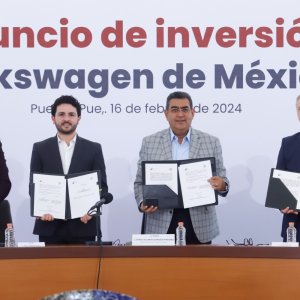MexCham Hong Kong: 16 Years Bridging Mexico, China

STORY INLINE POST
Q: What are MexCham HK Hong Kong’s key functions, contributions, and overall role in fostering business relations between Mexico and China?
A: MexCham HK was founded in 2008 as an initiative of Mexican entrepreneurs in Hong Kong. The chamber gained official recognition from Hong Kong authorities as a bilateral chamber in 2013. MexCham HK was the first Mexican and Latin American chamber in Asia to establish itself and gain recognition from local authorities, and it served as a role model for other Latin American chambers in the region.
MexCham HK's primary goal is to enhance commercial ties between Mexico and Hong Kong/Mainland China, representing Mexican businesses in this unique economic landscape. Beyond commerce and investment, MexCham HK promotes Latin American and Mexican culture through events such as the Mexican Summer Festival.
Q: In which industries is MexCham HK mainly involved?
A: The chamber brings together professionals like consultants, lawyers, and accountants dedicated to fostering business between Mexico and China. Our membership reflects a diversity of businesses, with a particular focus on the food and beverage industry, alongside notable representation from the e-commerce sector. Despite this diversity, the key sectors anchoring our chamber are food and beverage and consulting.
We represent Mexican companies and individuals in Hong Kong, as well as multinational companies, such as airlines and legal firms with interests related to Mexico.
Q: How have trade relations between Mexico and Hong Kong evolved over the past eight years?
A: The chamber has effectively put Hong Kong on the map. For Mexican entrepreneurs, the economic differences between Hong Kong and Mainland China can be unclear when seeking business opportunities, and MexCham HK has done great work in clearing up misconceptions. Leveraging our visibility and involvement in Hong Kong, we assisted entrepreneurs in identifying opportunities and understanding operations in Asia. The chamber actively participates in government consultations and international business events, contributing to Mexico's visibility. We actively engage and represent the Latin American community in discussions about Hong Kong's role as a global business hub.
Q: How have the needs of companies from both countries evolved?
A: Since Hong Kong’s return to China, it has consistently positioned itself as the gateway to Mainland China. Due to its distinct economic system, doing business in Hong Kong is easier than in Mainland China. With less red tape in establishing and complying with regulations for a corporate entity in Hong Kong, many companies, particularly those involved in trading or consulting, choose to establish their corporate base in Hong Kong before branching out to form subsidiaries in other regions in China.
The COVID-19 pandemic created challenges for travel. However, as borders opened again, Hong Kong solidified its role as the primary gateway to China. Hong Kong is strategically vital for capturing Chinese capital or finding Chinese partners. Conversely, Chinese individuals also come to Hong Kong for internationalization. For Mexican companies seeking capital or technological partners, Hong Kong serves as an excellent gateway. As a small economy dependent on trade and the financial sector, Hong Kong has taken significant steps in recent years to diversify into industries such as fintech, technology, and creative industries. Numerous programs, incubation facilities, and support for startups in these sectors make Hong Kong an ideal location for international projects.
Q: What is the status of trade relations between Mexico and Hong Kong?
A: Mexico's trade dynamics with Hong Kong and China are completely different, but interconnected. Mexico faces a trade deficit exceeding US$100 billion with China. About 8%-10% of trade from China to Mexico involves Hong Kong. Hong Kong-based companies play a role in purchasing and exporting these products to Mexico.
Despite being separate economic entities, Mexico exports more to Hong Kong than it imports. Over the past 10-15 years, Mexico has maintained a trade surplus with Hong Kong. Mexican exports to Hong Kong include integrated circuits, telephones, copper and concentrates, data processing units, and food and beverages. Opportunities for food and beverages exports from Mexico are increasing for products like berries, avocados, asparagus, tequila, and meat, mainly as a result of the direct cargo flight operated by Cathay Pacific since 2013. Mexico exports about US$742 million in merchandise to Hong Kong annually.
Q: What are the main concerns of Mexican companies when trying to do business in or with Hong Kong?
A: Initially, we worked mainly with Mexican companies that wanted to do business with China or Hong Kong but often lacked a clear understanding of the distinctions. Establishing a company in Hong Kong is remarkably straightforward, taking just a day for registration, and within seven days, a company is up and running. The tax structure is favorable in Hong Kong, with a 16% cap on profits and low salary taxes. Notably, there is no VAT, making invoicing and financial processes less complicated. In contrast, China's regulatory landscape demands more strategic planning due to increased regulations and the required initial capital. English is also one of the official languages in Hong Kong, facilitating business meetings, negotiations, contracts, and other legal matters.
However, we have received a significant increase in inquiries from Chinese companies seeking guidance on investing in Mexico, but also from Mexican projects seeking Chinese capital. Hong Kong's strategic position, housing headquarters of major Chinese companies, is crucial for capital flow and operations abroad.
Q: What are the main regulations Mexican businesses face when entering Hong Kong?
A: In Hong Kong, the perception of straightforward business regulations can be misleading. While setting up a company is easy, compliance is crucial. Annual audits, financial statement submissions, and adherence to labor laws are essential. Safety regulations are strict and compliance measures result in fewer incidents. Intellectual property protection is vital, and copying well-known brands is uncommon.
In essence, doing business in Hong Kong is simple but strict compliance is necessary. Employers must seek guidance from organizations such as MexCham HK, as well as accountants or legal experts to ensure ongoing adherence to regulations beyond the initial company setup.
Q: What business opportunities have Mexican companies yet to explore?
A: The Greater Bay Area (GBA) initiative, which integrates several cities in Guangdong Province as well as the Special Administrative Regions of Macau and Hong Kong into a business hub, has created significant opportunities for foreign companies entering China via Hong Kong. Sectors such as e-commerce, fintech, creative industries, health, green industries, and biotechnology are thriving in this environment. With its easy company setup, incubation programs, and available capital, Hong Kong serves as an ideal hub for international expansion. The GBA initiative also opened doors for industries that are more regulated in China, such as legal services, architecture, health, and consulting. Environmental initiatives in the region also present business prospects. As an established chamber in Hong Kong, we facilitate connections and promote matchmaking opportunities for entrepreneurs seeking to explore these avenues.
Q: What was the impact of the USMCA on trade flows between Hong Kong and Mexico?
A: Manufacturing in China involves not only Chinese capital companies but also those from Japan, Malaysia, South Korea, Taiwan, and other economies. Over the years, rising labor costs and increased regulations have led businesses, including foreign companies, to consider alternatives. Many initially used China as an export platform but are now adopting a "China plus one" strategy, diversifying operations to other locations. Vietnam and Thailand were initial destinations, but the uncertainty of the US-China trade war prompted a shift. With unclear US trade policies, more companies are exploring alternatives closer to the US market.
Mexico, despite the distance, has seen an increase in inquiries from businesses looking to diversify away from China. Notably, Japanese and South Korean businesses are familiar with Mexico, while others may need more clarification on Mexico's role in a "China plus one" strategy. In the past two years, we have witnessed a growth in inquiries of Chinese entrepreneurs considering investing in Mexico. It is also essential to recognize differences in capital availability and risk tolerance between Mainland Chinese and other economies’ entrepreneurs, who may have more resources or stronger financial support. We are also seeing more Chinese state-owned enterprises actively seeking investment opportunities in Latin America.
Chinese investors view Mexico as the next investment hotspot. However, Mexico has not fully capitalized on its potential due to infrastructure gaps and a lack of sustained demographic advantages. Chinese entrepreneurs now see Mexico as an attractive destination for manufacturing, e-commerce, real estate, industrial parks, and various other projects. Despite increased interest, Mexico lacks the necessary infrastructure to absorb this investment effectively. The absence of a clear industrial policy and specific incentives hinders Mexico's ability to attract and use Chinese investment optimally. The Mexican government's efforts are fragmented, lacking a cohesive approach to promote the country effectively. While Chinese investors continue to explore opportunities in Mexico, the country must act strategically to channel these investments into infrastructure development, technological advances, and skills.
Q: What role will MexCham Hong Kong play in making Mexico an investment destination?
A: We want to guide both Mexican and Chinese entrepreneurs in navigating the regulatory landscape in Mexico, which, while open to investment, can be complex in areas like taxes, labor, and real estate. As a chamber, we would like more Mexican companies to become members to strengthen our ability to facilitate the influx of Chinese entrepreneurs into Mexico. Providing a positive experience for Chinese investors in Mexico will encourage more favorable feedback, making Mexico an attractive investment destination.
Q: What benefits do companies and people receive from joining MexCham HK?
A: The support and know-how of Mexicans with a full understanding of the Chinese and Mexico business environment for doing business on both sides of the world. We offer guidance and assistance to make businesses feel welcome in Hong Kong. The second is visibility: we serve as a platform to promote investment projects. We would like more Mexican entrepreneurs to join the chamber, enabling us to organize more events, have a fuller agenda, and create more awareness of the current opportunities to promote Mexico further in China.
Asia is an incredibly interesting region with numerous commercial and investment opportunities for Mexico. Hong Kong, with its regulatory environment and language advantages, is an excellent starting point for exploring Asia. The contacts one can establish here make it a low-risk entry point. We will do our best to guide, accompany, and promote their products and services in Hong Kong through MexCham HK.







 By Fernando Mares | Journalist & Industry Analyst -
Thu, 02/15/2024 - 10:46
By Fernando Mares | Journalist & Industry Analyst -
Thu, 02/15/2024 - 10:46
















